
|
Annual scholarship breakfast for alumni and friends raises $102,000 "How we think about our social reality has everything to do with how we act on that reality. At the end of the day, action is thought’s greatest gift."
This year’s keynote speaker was Eric Liu, author, educator and founder of Citizen University. Liu shared his passion for creating a nation of civic leaders, noting in his remarks that “we are all better off when we are all better off…. When other people start doing better—economically, emotionally, psychologically, civically—you do better, too.” Liu shared pragmatic tools that anyone can employ to become a more effective citizen. Vaughnetta J. Barton (MSW ’97), who leads the School’s Communities in Action initiative, emceed the event. Sponsors included Bill & Melinda Gates Foundation, Era Living, Seattle Children’s Hospital, Regence BlueShield and Casey Family Programs. Alumni gift helps Cambodians treat survivors of sex trafficking In 2004, the School of Social Work began a partnership with Cambodia’s Royal University of Phnom Penh (RUPP), which continues to provide graduate-level training to Cambodian social workers who are determined to rebuild their war-torn country. Recently, a generous gift from School alumna and licensed clinical social worker Martha Moyer (MSW ’69) (photo, center) and her husband, George (MBA '70), established a continuing education course at RUPP that focuses on Cambodians who work with survivors of sex trafficking.
School establishes center for healthy aging, one of five in the nation By the year 2030, nearly one-fifth of the U.S. population will be 65 or older, according to the Pew Research Center. To prepare for this aging population, the School of Social Work was selected to be the site of a center focused on geriatric research, training and the integration of health-related services to older adults. It is one of only five such centers nationwide. Called the Healthy Generations Hartford Center of Excellence in Geriatric Social Work, the center will tackle multigenerational issues affecting elderly Americans and their caretakers, and will also develop curriculum materials for students and practitioners. The center is named for its funder, John A. Hartford Foundation, and chosen by the Gerontological Society of America. Read more. Alumna develops mental health survey that aids refugees
Working with Seattle and King County public health agencies and other organizations, Farmer created a 15-question survey written in simple, effective and culturally correct language. King County uses the survey to screen all new refugees, and plans are underway to roll out the screening tool statewide. Farmer has received requests for information on the screening tool from around the world, including Hong Kong, Germany and Australia. Learn more about Farmer’s survey in this KUOW interview. Research and training grants underscore expertise in social health and well-being
Amnon Shoenfeld honored for mental health leadership with 2014 Distinguished Alumni Award
Please celebrate with us. Join
Amnon Shoenfeld to celebrate his selection as the School’s 2014
distinguished alumnus at a special reception preceding our graduation
ceremony at the Alaska Airlines Arena in the Hec Edmundson Pavilion on
the UW campus. The reception is on June 12 from 4:30 to 5:30 p.m. in the
pavilion’s Founders Club. Please RSVP by sending an email to Greg Ross or by calling 206-221-7735. Michael Kilmer recognized with inaugural Early Career Achievement Award Michael
Kilmer (MSW ’04) is the first recipient of the School’s Early Career
Achievement Award. Inaugurated this year, the award recognizes alumni who, within 12
years of receiving their last degree from the School of Social Work, are
carrying For the past 10 years, Kilmer has held supervisory positions at the U.S. Department of Veterans Affairs. Currently he is chief consultant of care management and social work services at the Veterans Health Administration in Washington, D.C., which is the country’s largest integrated health care system. There, he supervises social work services provided by nearly 11,000 social workers as well as more than 1,000 social work student placements. Read the full story. Please celebrate with us. Join Michael Kilmer to celebrate his selection as the School’s early career achievement award recipient at a special reception preceding our graduation ceremony at the Alaska Airlines Arena in the Hec Edmundson Pavilion on the UW campus. The reception is on June 12 from 4:30 to 5:30 p.m. in the pavilion’s Founders Club. Please RSVP by sending an email to Greg Ross or by calling 206-221-7735. Taryn Lindhorst receives award for palliative care research and education Carol LaMare Associate Professor Taryn Lindhorst received the 2014 Award of Excellence in Education and Research from the Social Work Hospice & Palliative Care Network. Nominated by her peers, Lindhorst was cited for her outstanding leadership and ongoing commitment to providing the highest level of scholarship to support the seriously ill, dying or bereaved. Lindhorst supervises the School’s Carol LaMare Scholars Program, which awards scholarships to students and faculty who specialize in oncology social work or palliative care. Alumna receives inaugural community award for service to women and children On March 20, Camie Goldhammer
(MSW '06) received the first Libin Egal Spirit Award from Seattle’s Open Arms
Perinatal Services, which provides Biennial report receives top communications award at CASE conference Luminaries: Profiles in Social
Innovation, the School’s 2011-12
biennial report produced by the School's Office of Advancement and Communications Director Bruce Betz took
gold in the “Fundraising, Special Event & Other Seattle Times columnist Jerry Large commends Communities That Care initiative Communities That Care is an innovative community-centered program created by the School-affiliated Social Development Research Group to improve the futures of young people and their families. Used successfully in cities around the country, the prevention program was recently launched in central and southeast Seattle. In a Jan. 29 column in The Seattle Times, columnist Jerry Large commended the research group for creating a program that inspires entire communities to take ownership of their needs and address them in systematic, research-tested ways. According to Large, “Communities That Care has already proven it works and is worth cheering for.” Forefront drives legislative and media focus on suicide prevention Forefront Director Sue Eastgard (MSW '88), Assistant Professor Jennifer Stuber and Rep. Tina Orwall (MSW '91) (D-Des Moines) joined forces this winter to help shape a bill (ESHB 2315) that requires suicide prevention training for primary-care providers. Eastgard, Stuber and Orwall put together a grassroots campaign that included convening stakeholders to write the legislation, contributing expert testimony for committee hearings, working with suicide-attempt survivors and those who have lost a friend or relative to suicide to tell their stories, and organizing a lobby day so that citizens could explain the importance of suicide prevention in face-to-face sessions with legislators. Signed into law on March 27, the legislation also sets up a pilot advice line for front-line providers treating suicidal patients and creates a statewide suicide prevention plan. The impetus for the law came from research showing that a vast majority of suicides are preventable, but that health care professionals receive little, if any, training in diagnosis or treatment of those at risk of suicide—a problem Stuber discussed in a Jan. 26 Seattle Times essay. An estimated 95 percent of those individuals experienced undiagnosed, under-treated or untreated mental health disorders such as depression; and almost half had seen a primary-care provider in the month before their deaths. Stuber was also interviewed by KUOW on the same subject. New research shows social workers can help those with mild traumatic brain injuries
Moore created a quick procedure for social workers to administer to patients leaving the emergency room. The counseling provides them with coping strategies, resources and a brief alcohol intervention screening. Compared with people who received only medical care, the group who got the additional counseling was doing significantly better three months later. Learn more about Moore’s study in an interview by KUOW health and science reporter Gabriel Spitzer. Colors of Hope highlights art by cancer survivors and caregivers Art is a universal language of expression that reaches across
cultures and speaks to us on a deeply human level. The Colors The collection, an international initiative of The Max Foundation, provides a worldwide avenue for the visual expression of feelings related to the cancer journey—specifically, recognition of the positive outcomes of the journey itself. The exhibit is open to the public. Tessa Evans-Campbell explores resiliency among Native Americans in May 15 lecture Historical trauma associated with Indian child welfare has had a tremendous impact on multiple generations of Native Americans. In the next installment of the Luminary Lectures series—Making Our Way Back Home: Indigenous Resilience and Resistance in Child Welfare—Associate Professor Tessa Evans-Campbell explores recent research conducted on the resiliency of indigenous people, as seen against the historical context of Indian boarding schools and public child welfare policies. She will illustrate the effects those policies have had on family well-being, contemporary Native American identity, and indigenous-led strategies to strengthen resistance and promote healing. The presentation is May 15 at 5:30 p.m. in Room 305, School of Social Work. RSVP here. Social work labor series in May focuses on immigrant rights and worker struggles Mental health and social services
dominate the field of social work today, but the profession has roots in
the early 1900s' workers’ and School celebrates graduates on June 12 The School of Social Work will graduate 252 individuals on Thursday, June 12. The ceremony will be from 6 to 8:30 p.m. at Alaska Airlines Arena with a reception to follow. Guests should plan to arrive by 4:30 p.m. More information about the 2014 graduation celebration is available online, including a frequently asked questions page. Herman McKinney, Seattle community leader and advocate, dies Herman McKinney, a tireless advocate for diversity in graduate education and equal opportunity in corporate hiring, died April 11 at the age of 75. An elder statesman in the African-American community, McKinney started his career in banking but soon transferred to social work. He received an MSW from the School in 1968 and worked for nine years as assistant dean of the minority education division at the UW Graduate School.
The Seattle Metropolitan Chamber of Commerce was so impressed they hired McKinney to lead a new initiative, the Urban Enterprise Center, where he served as director from 1993 to 2006. McKinney is credited with reducing tensions in the city during that era by bring race issues out into the open. He helped thousands of low-income people get jobs through a partnership between the state Employment Security Department and more than 900 companies. In 2000, he received the School’s Distinguished Alumni Award. “It is difficult to think of anyone who has done more to advance the cause of social justice and civil rights in Seattle than Herm,” said School of Social Work Dean Eddie Uehara. “Throughout his life and illustrious career, he modeled the kind of courage, conviction, optimism and imagination it takes to be a successful agent of social transformation.” McKinney is survived by his wife, Norma, three children—Kristal (MSW ’05), Kevin and Kent—eight grandchildren and five great-grandchildren. Emeritus faculty member Sidney Miller is remembered Emeritus faculty member Sidney Miller passed away Feb. 16 at age 91. Born in Brooklyn, N.Y., Miller attended Brooklyn
College and later served as an airplane mechanic at American bases in England
during World War II. Miller returned to New York after the war and attended Brooklyn
College before transferring to Columbia University. In 1951, he earned a
bachelor’s degree in psychology at Columbia, and two years later, a master’s
degree in psychiatric social work. In 1953, Miller and his wife, Janet, moved to
Seattle, where he was a social worker at the King County Juvenile Court and
later at Ryther Child Center. He served as an associate professor at the School
until 1988. Read the full obituary and make a contribution to the Sidney Miller Memorial Scholarship Fund.
|
Giving CAREER MENTORSHIP NETWORK The Alumni Career Mentorship Network links seasoned social work professionals with current social work students and recent graduates exploring career options. SHARE YOUR NEWS MAKE A GIFT |

|
|
|
|
THIS MESSAGE WAS SENT BY: UW School of Social Work, Box 354900, 4101 15th Avenue NE, Seattle, WA 98105 © 2017 University of Washington | Contact Us | Privacy Policy This e-mail message was sent to Manage Your Subscriptions or Unsubscribe |

|
|
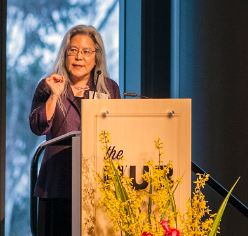 With
those insightful words, Eddie Uehara, Professor and Ballmer Endowed Dean in
Social Work, welcomed nearly 250 alumni and guests to the 5th Annual
Scholarship Breakfast on March 18. The event raised about $102,000 for
need-based scholarships to assist future MSW students.
With
those insightful words, Eddie Uehara, Professor and Ballmer Endowed Dean in
Social Work, welcomed nearly 250 alumni and guests to the 5th Annual
Scholarship Breakfast on March 18. The event raised about $102,000 for
need-based scholarships to assist future MSW students. 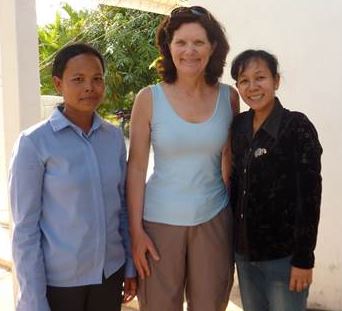 One
of Asia’s poorest nations, Cambodia has a sex trade industry that is
growing at
an alarming rate. UNICEF estimates that 40,000 to 100,000 individuals
are caught
up in the nation’s sex industry; children account for about one-third of
that
figure. The Moyers' gift will provide scholarships for up to 20 staff
members of organizations that work with sex-traffic survivors to attend a
semester-long course at RUPP. “Many
local nongovernmental organizations are operating on a shoestring,”
explains the partnership's director and social work professor
One
of Asia’s poorest nations, Cambodia has a sex trade industry that is
growing at
an alarming rate. UNICEF estimates that 40,000 to 100,000 individuals
are caught
up in the nation’s sex industry; children account for about one-third of
that
figure. The Moyers' gift will provide scholarships for up to 20 staff
members of organizations that work with sex-traffic survivors to attend a
semester-long course at RUPP. “Many
local nongovernmental organizations are operating on a shoestring,”
explains the partnership's director and social work professor 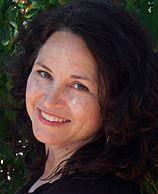 Refugees
coming to the United States from strife-torn countries often struggle with nightmares, depression or PTSD, but
cultural stigmas, language barriers and other issues make it difficult for them
to seek help. Now, a new tool developed by School alumna Beth Farmer (MSW '08),
program director at Lutheran Community Services, helps screen for mental health
problems before they become more serious.
Refugees
coming to the United States from strife-torn countries often struggle with nightmares, depression or PTSD, but
cultural stigmas, language barriers and other issues make it difficult for them
to seek help. Now, a new tool developed by School alumna Beth Farmer (MSW '08),
program director at Lutheran Community Services, helps screen for mental health
problems before they become more serious. 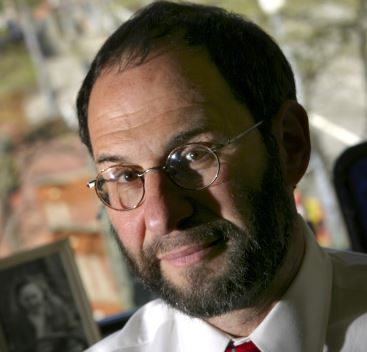 Amnon
Shoenfeld
(MSW ’79) is the recipient of the 2014 School of Social Work
Distinguished Alumni
Award. A passionate and dedicated champion for individuals with mental
illness or substance abuse issues, Shoenfeld recently retired as
director of
the King County Mental Health, Chemical Abuse and Dependency Services
Division,
where he worked for more than 30 years. Under his leadership, King
County implemented a range of programs and services to connect those in
the criminal justice system with unmet mental health or substance abuse
needs with treatment, housing and other support services. Those
receiving services are often able to reduce their incarceration time and
experience a more successful re-entry into the community.
Amnon
Shoenfeld
(MSW ’79) is the recipient of the 2014 School of Social Work
Distinguished Alumni
Award. A passionate and dedicated champion for individuals with mental
illness or substance abuse issues, Shoenfeld recently retired as
director of
the King County Mental Health, Chemical Abuse and Dependency Services
Division,
where he worked for more than 30 years. Under his leadership, King
County implemented a range of programs and services to connect those in
the criminal justice system with unmet mental health or substance abuse
needs with treatment, housing and other support services. Those
receiving services are often able to reduce their incarceration time and
experience a more successful re-entry into the community. 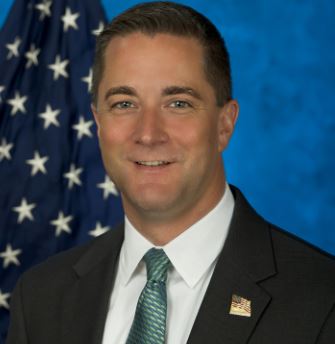 out innovative work, demonstrating influence in their field and making
a notable impact on the social work profession.
out innovative work, demonstrating influence in their field and making
a notable impact on the social work profession. 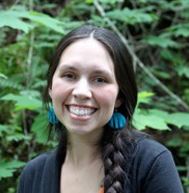 community-based
support for women through
pregnancy and birth. The award, to be given each spring to a community
member,
was named in honor of Open Arms member and doula Libin Egal, who died
this year. Another School alumna, Sheila Capestany (MSW '07; MPH '08),
currently serves as Open
Arms’ executive director, where she brings more than 20 years’
experience in
nonprofit leadership, development and strategic planning. Established in
1997,
Open Arms has a strong community following, especially among Somali and
Latina
women. Its outreach doula program was the first in the country to
achieve
national accreditation.
community-based
support for women through
pregnancy and birth. The award, to be given each spring to a community
member,
was named in honor of Open Arms member and doula Libin Egal, who died
this year. Another School alumna, Sheila Capestany (MSW '07; MPH '08),
currently serves as Open
Arms’ executive director, where she brings more than 20 years’
experience in
nonprofit leadership, development and strategic planning. Established in
1997,
Open Arms has a strong community following, especially among Somali and
Latina
women. Its outreach doula program was the first in the country to
achieve
national accreditation. 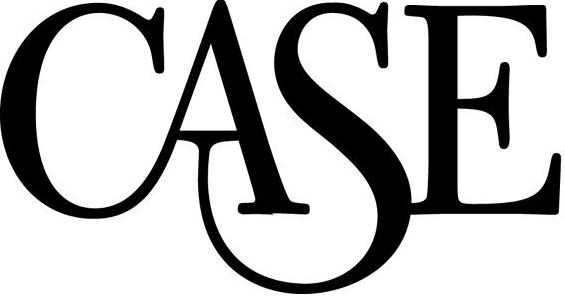 Communications” category from
the Council for Advancement and Support of Education. The award recognizes
excellence in marketing and communications among more than 130 universities and
colleges in 12 states and provinces in the Pacific Northwest and Western
Canada.
Communications” category from
the Council for Advancement and Support of Education. The award recognizes
excellence in marketing and communications among more than 130 universities and
colleges in 12 states and provinces in the Pacific Northwest and Western
Canada.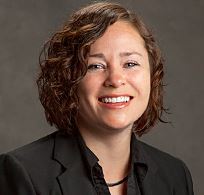 For patients suffering from mild
traumatic brain injuries, just 20 minutes spent talking with a social worker
before being discharged can aid in the recovery process, according to a new study led by
For patients suffering from mild
traumatic brain injuries, just 20 minutes spent talking with a social worker
before being discharged can aid in the recovery process, according to a new study led by 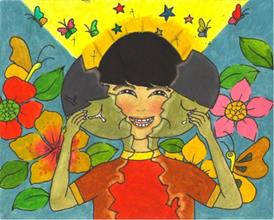 of
Hope Art Collection, on display from April 21 to Aug. 21 in the
School's first floor gallery, consists of 24 pieces of art from around
the world, illustrating the human
experience of a cancer diagnosis.
of
Hope Art Collection, on display from April 21 to Aug. 21 in the
School's first floor gallery, consists of 24 pieces of art from around
the world, illustrating the human
experience of a cancer diagnosis. 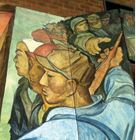 unions’ rights
movement. To revitalize the link between labor rights and social work,
the School of Social Work is hosting a series of discussions called
unions’ rights
movement. To revitalize the link between labor rights and social work,
the School of Social Work is hosting a series of discussions called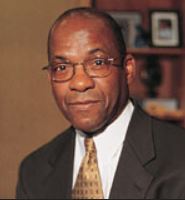 In 1976, McKinney founded
The Breakfast Group, an association of African-American men who served as
mentors to young black males who had been expelled from school or were in
danger of being expelled. In 1993, he
led a march of 8,000 people downtown, calling on the business community to
invest more in the city’s poorer neighborhoods.
In 1976, McKinney founded
The Breakfast Group, an association of African-American men who served as
mentors to young black males who had been expelled from school or were in
danger of being expelled. In 1993, he
led a march of 8,000 people downtown, calling on the business community to
invest more in the city’s poorer neighborhoods.